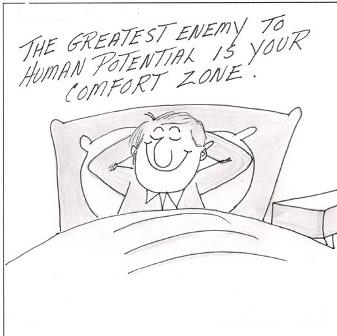3.1 Comfort zones
Some people are much more open than others to making changes in their lives that lead to (or result from) learning. Even though we are not satisfied with our lives, sometimes it may feel easier to stay within our comfort zone than to venture into new territory. Author and life coach Fiona Harrold suggests that we have to:
get used to feeling comfortable with a little discomfort and a little uncertainty alongside a great deal of positive expectancy. Turn anxiety into anticipation, fear into energy and worry into action.
Harrold explains that excitement and fear produce similar hormones. The more you live within your comfort zone, she adds, the harder it is to distinguish between these emotions because you have not had enough practice. She suggests that:
To live your best life you have to move out of your comfort zone and learn to manage your feelings.

